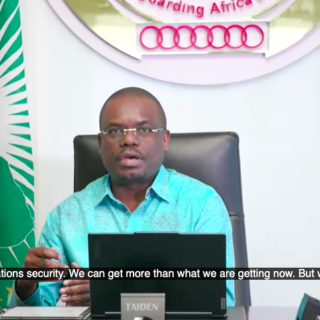
Saz da Great’s flow makes it hard to believe that he is from Cankuzo, one of Burundi’s least developed provinces. But, according to him rap is universal. Anyone – from the city or the countryside – can do it and excel at it. Here’s the story of a nugget who dreamed of himself as the Burundian Tupac.
The goal, Saz de Great, 25, pursues in music comes in 4 sentences: “to express himself, to be the people’s spokesperson, entertain people, and then live from his passion.”
Music and him is a love story: when he was 7 years old, living in Cankuzo, he was already part of dance groups aspiring to be the next Michael Jackson. A passion for dance that he will continue to pursue in secondary school at Lycee SOS in Bujumbura.
Lycée SOS, that’s where he begun to write his own songs. A poem here, a rap text there. A passion for rhyming texts that will be catalyzed between 2012 and 2014, when Radio Bonesha’s Top Ten Tube program claimed the hearts of Burundian music lovers, putting rap on the page and promoting new musicians who late became true symbols of that music genre.
Fair to say that, before Radio Bonesha’s Top Ten Tube program came, rap was not very popular in Burundi and except for stars like the late Soso K – may he rest in peace- T-Max, Big Fizzo from time to time or Uncle Crazy, few did rap. DJ Prince, 19th, Prince Mshindi, and the group Overdo Team Forever are part of this wave of stars promoted by Radio Bonesha FM and its famous host Davy Carmel Ingabire who later took up residence in Rwanda, where he became a star host of the National Rwandan Television.
Saz da Great entered music industry by tiptoeing starting by making song challenges here and there on social media from 2017, the author of 5 solo pieces and so many other collaborations with other young artists would see his talent finally being recognized on a big platform during the music competition “We Got Talents: Singing & Rap” organized on Instagram by Nella Neth, Burundian influencer living in Sweden.
According to this son of Buhumuza, Eastern Burundi, rap is the most sacred genre of music. “Would other music genre allow me to write texts as long as rap? The other musical styles, you do 10 sentences, you are sure to have already lost your listeners, that’s why I like rap. It’s an engaged style, it’s lively, it’s the free expression of a soul,” does Saz defend, even if he does not exclude the possibility of doing other musical styles. But where does he find the inspiration? For him inspiration is ambient,« It is everywhere in the air, in people’s lives, it is the inspiration that comes to me and never the opposite.»
Even if Saz da Great, is graduate in statistics at the University of Lake Tanganyika therefore could pretend to excellent jobs in other fields, his greatest dream is making a career in music especially when there are now many encouraging elements in Buja Fleva – the music industry of Burundi: “I no longer see hatred between artists as was the case before, the artists are more united. Another positive point: the artists have become more creative, more open to trying things. What also pleases me is to see that Kirundi, the mother tongue valued: many are starting to take an interest in writing their music in Kirundi. Before, we had only artists who wrote in Swahili.”
But all is not fine, say? «No, there is a very serious problem, many artists are blinded by easy success. Especially, since with the advent of social networks you can be a star overnight. » criticizes the artist. Other obstacle to correct is the fact that nowadays, it has became common to bribe music promoters to make it out into music. « I personnaly feel like this is the greatest evil of our music industry because. It is no longer the talent that counts but the money or the other means of corruption. If this continue to be the norm, then we will see few artists like me who come from the countryside and burst onto the big stage.»
To end, tell us Saz, between 19th and DJ Prince who is the best? “19th, of course. This guy made songs that will go down in history. He has inspired a lot of young artists. He knows how to give deep messages while remaining playful in his texts. His legacy is immense.”
An article by Chris Herbert Kaze



